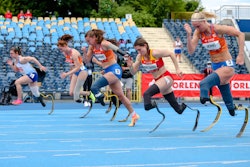LANSING, Mich. — Professional interpreters and recent graduates of sign language programs have criticized new rules taking effect in Michigan requiring more stringent education and testing requirements for sign language interpreters.
The 2007 law was prompted by miscommunication in legal and medical settings and is intended to prevent interpreter mistakes, The Detroit News reported.
Some longtime professional interpreters and graduates of college-level sign language programs described the new state licensing test is difficult. They also said it is too focused on certain English language concepts not used in everyday interpreting with deaf people.
“I feel the state’s requiring me to get a college education for something that comes naturally to me,” said Robina Anderson, an interpreter from Trenton and the daughter of two deaf parents.
Anderson has used sign language for 55 years but has twice failed a new state exam that places a heavy emphasis on antonyms, synonyms and reading comprehension. Her state certification will become invalid this year under a licensing requirement set to go into effect in June.
Sheryl Emery, director of the state Division on Deaf and Hard of Hearing, led implementation of the rules. Emery, who is deaf, said state classifications will make it easier for government institutions and medical providers to know they’re getting a qualified interpreter.
Emery said not everyone who knows sign language is cut out to be an interpreter.
“Often people mistakenly think children who have deaf parents can interpret or grow up to become excellent interpreters. Some do, some don’t,” Emery said in an email. “Just having a dad who is a master mechanic is no guarantee that the child will grow up to be a master mechanic.”
Despite an increase in the number of certified interpreters in Michigan in recent years, some hospitals and agencies that are legally required to provide interpreters are reporting shortages and longer wait times to get an interpreter in an emergency room or medical appointment.
“It’s a lot more juggling before it was no big deal” to get an interpreter in a timely manner, said Kathy Lark, patient rights representative at Botsford Hospital in Farmington Hills.
Debbie Mitre-Smith, assistant professor of sign language studies at Madonna University in Livonia, who is deaf, said she thinks the interpreter shortage will be temporary but necessary “to weed out inadequate interpreters.”
“I understand that interpreters need to earn a living but sometimes they are accepting assignments that are beyond their level of comprehension to pay their bills, yet bringing on potential danger to the deaf consumers,” Mitre-Smith said in an email.
![Screenshot 2024 06 05 141719[91541]](https://img.diverseeducation.com/files/base/diverse/all/image/2024/06/Screenshot_2024_06_05_141719_91541_.66613a2803b85.png?auto=format%2Ccompress&fit=crop&h=107&q=70&w=160)




![Screenshot 2024 06 05 141719[91541]](https://img.diverseeducation.com/files/base/diverse/all/image/2024/06/Screenshot_2024_06_05_141719_91541_.66613a2803b85.png?auto=format%2Ccompress&fit=crop&h=167&q=70&w=250)













